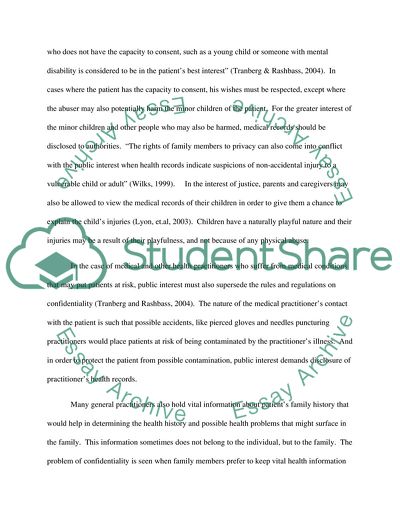Cite this document
(Public Disclosure of Health Records Article Example | Topics and Well Written Essays - 2000 words, n.d.)
Public Disclosure of Health Records Article Example | Topics and Well Written Essays - 2000 words. https://studentshare.org/health-sciences-medicine/1549336-the-publics-interest-should-be-taken-more-into-account-when-the-decision-is-made-to-disclose-a-persons-health-details-discuss-with-reference-to-public-health-law-and-confidentiality
Public Disclosure of Health Records Article Example | Topics and Well Written Essays - 2000 words. https://studentshare.org/health-sciences-medicine/1549336-the-publics-interest-should-be-taken-more-into-account-when-the-decision-is-made-to-disclose-a-persons-health-details-discuss-with-reference-to-public-health-law-and-confidentiality
(Public Disclosure of Health Records Article Example | Topics and Well Written Essays - 2000 Words)
Public Disclosure of Health Records Article Example | Topics and Well Written Essays - 2000 Words. https://studentshare.org/health-sciences-medicine/1549336-the-publics-interest-should-be-taken-more-into-account-when-the-decision-is-made-to-disclose-a-persons-health-details-discuss-with-reference-to-public-health-law-and-confidentiality.
Public Disclosure of Health Records Article Example | Topics and Well Written Essays - 2000 Words. https://studentshare.org/health-sciences-medicine/1549336-the-publics-interest-should-be-taken-more-into-account-when-the-decision-is-made-to-disclose-a-persons-health-details-discuss-with-reference-to-public-health-law-and-confidentiality.
“Public Disclosure of Health Records Article Example | Topics and Well Written Essays - 2000 Words”. https://studentshare.org/health-sciences-medicine/1549336-the-publics-interest-should-be-taken-more-into-account-when-the-decision-is-made-to-disclose-a-persons-health-details-discuss-with-reference-to-public-health-law-and-confidentiality.


